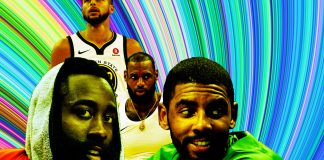The Boston Celtics, Jimmy Butler and Gordon Hayward spent all summer associated with each other, but Boston was worried about the two All-Star forwards meshing.
If we’re honest here, the Celtics were rumored to land any star who wanted out of their current situation. Gordon Hayward and Jimmy Butler were the most talked about, with Paul George being close behind, but the Celtics ultimately gave up their chase on Butler.
According to ESPN’s Zach Lowe, the organization worried about the dynamics of Butler and Hayward, both on and off the court. It’s a legitimate concern.
Boston was one of the only teams in the league capable of acquiring two stars this summer. They had the cap room to sign Hayward, but also a laundry list of assets to part with if Danny Ainge decided to stop hoarding draft picks and young players.
Also Read: Ben Simmons Wants To Be NBA’s Best
The Celtics’ relenting let the Minnesota Timberwolves trade for Butler in what was arguably the biggest steal of the summer. On draft night, the Wolves sent Zach LaVine, Kris Dunn and Lauri Markkanen to Chicago for the 27-year-old. What also played into the lack of a deal was Ainge not wanting to let go of his draft picks. Either the third overall pick in 2017 or the Brooklyn Nets’ pick in 2018 would’ve been enough.
The odd part about this situation is that Ainge just parted with the Nets pick. Boston worked out the blockbuster of the summer with the Cleveland Cavaliers, which is sending Kyrie Irving to Beantown for Isaiah Thomas, Jae Crowder and Ante Zizic along with Brooklyn’s selection. It’s funny because Butler is the better player, and Ainge said the Wolves gave up too much when trading for him even though the Celtics coughed up the bigger package.
Ainge is right to have apprehension about the two forwards. Both play a similar game. Hayward is a better scorer from the perimeter, whereas Butler likes to attack downhill and get to the free throw line. Additionally, the Bulls relied on Butler to create a lot of their offense, and he averaged a career-best 5.5 assists for a team that desperately needed playmakers.
One common thread both share is that they were both high-usage first-options for their previous teams. Chicago had issues putting points on the board, but so did Utah; when Hayward sat, the Jazz were 5.2 points per 100 possessions (106.9) worse. It would be an enormous pain assimilating Hayward and Butler into a Celtics offense that already had Thomas cemented as their guy. There’s no doubt it’d be lethal, but there’s only one basketball, and we don’t know if there would be a seamless transition. Hayward, because of his outside shot, would be golden. He’d get a handful of open looks each game. Butler, who shot just 36.7 percent from downtown, isn’t as big of a threat to bury the three-ball and defense would play him as such.
Also Read: Prime Lamar Odom Would Dominate Today’s NBA
What’s also ironic about Butler is that he’s going to have the same exact issue with Minnesota. How it works out there is how it’d likely be in Boston.
Not everything would be bad, however. Brad Stevens is a phenomenal coach, and I’m sure he’d figure out the right rotation quickly. Further, Boston would have three shot creators at the ready. In today’s NBA, having players who can get their own looks on a consistent basis is vital.
As far as personalities go, I feel like Ainge was worried about Butler rubbing some of his players the wrong way. He’s one of those guys who’s ultra-competitive; nothing will stop him from winning, and if the other guys aren’t pulling their weight, he’ll let them know about it. Some aren’t fond of that. However, there’s nothing wrong. Unlike Chicago, the Celtics would have a chance to contend. And winning cures all.
The more I think about it — I don’t think Bostonians would’ve had any problems with how Butler acts. They love the gritty players who lay everything on the court (just like a 5-9 point guard did), and Jimmy is max-effort all of the time. Hayward is also, but he’s not an alpha like Butler is.
Start a conversation with me on Twitter


Pingback: Jimmy Butler: Fred Hoiberg Wasn't Confrontational()